The Island of Sea Women Read online
Page 31
“There!” Gu-ja shouted. “Her tewak.”
I knew this area well—all the grandmother-divers did—and seeing that the tewak had drifted farther out to sea was concerning.
Those of us on the boat picked up our oars and began rowing, leaving several divers in the water. We wanted to get to Wan-soon’s tewak quickly, but to be efficient we had to keep our rhythm. When we reached the tewak, Gu-sun and Gu-ja dropped their oars and stood. Gu-sun yelled at us to be quiet, so we could listen for Wan-soon’s sumbisori, but it was nowhere on the wind. Slowly turning in circles, the sisters scanned the swells. They must have tried for five minutes, far longer than a haenyeo could stay underwater. The aunt looked terrified and desperate, while the mother looked sad and resigned.
“Everyone,” Gu-ja said, “we need to get back in the water. Hurry.” Then she spoke the words no one wanted to hear. “We must find Wan-soon’s body before it’s lost to the sea and she becomes a hungry ghost.”
Face masks were fitted back into place, and everyone leapt into the water. Those who were already in the sea were coming closer. Gu-sun called to them. “We’re looking for Wan-soon. Search the area where you are.”
The baby-divers, including my daughter, fanned out across the plateau. If an abalone had grabbed Wan-soon’s bitchang or if her hair or clothing had somehow gotten caught on a rock, they’d find her body. The small-divers and grandmother-divers swam down the sides of the plateau. Nothing. Every time I resurfaced, women yelled questions across the cresting waves, which were growing larger now. Did you search here? Did you search there? Nothing here. Nothing there. Down again.
The next time I surfaced, I spotted Min-lee with her arms draped over Wan-soon’s tewak. I was not much younger than she was now when Yu-ri had her accident, so I knew the guilt and remorse my daughter had to be feeling. I swam over to her.
“Wouldn’t she need to be near her tewak?” Min-lee asked before sucking in her lips to hold in her emotions.
“Hopefully,” I said. “Let’s look together.”
I took her hand, and we swam down directly beneath Wan-soon’s float. I was immediately alarmed by what I saw and felt. We were at the farthest edge of the plateau. The current was strong here, and the vastness of the sea grabbed at us, but my daughter was too focused on the search to notice. I let her set the pace and depth, conscious that Wan-soon wouldn’t have been able to go faster or deeper than my daughter. We had not yet reached two body lengths when Min-lee stopped. Together we righted our bodies. Min-lee couldn’t hold her breath for much longer, but I needed to show her something. I held up my free hand to stop her from returning to the surface. Then I let go of her. The suck of the sea was so strong here that she was immediately pulled away from me. A look of terror passed over her face with the knowledge that she too might be drawn into a current that could take her body hundreds, if not more, kilometers away. I grabbed her hand and with the strength of many years of diving, I guided her away from danger and up to the surface.
Our search was over. We would not find Wan-soon today.
Once everyone was back on the boat, Gu-ja addressed us. “When we reach shore, I’ll send word to the haenyeo chiefs in the neighboring villages.” She put a hand on her sister’s shoulder, but Gu-sun shrugged it off. “By the end of tomorrow, word will have circled the island and reached every haenyeo and fisherman. Let us pray to the Dragon Sea God and every goddess who has sway in the sea to bring Wan-soon’s body to shore.”
Gu-ja picked up her oar, and the rest of us took our places. I couldn’t imagine what was going through her mind. Dealing with an accident or death is every haenyeo chief’s greatest torment. She must lead, even as she feels grief and culpability. My mother had not been responsible for Yu-ri’s greed or her encounter with the octopus, and yet the burden of what happened had weighed heavily upon her. This situation was different. Gu-ja couldn’t have anticipated this calamity, but the fact remained that she’d chosen this spot to dive out of jealousy and spite. That anyone died was terrible, but Gu-ja had to feel even more sorrowful because the victim was her niece.
* * *
It is said that after experiencing the vast unknowable sea, a daughter comes to know her mother and understand her for the first time. Indeed, on the day of Yu-ri’s accident I’d seen my mother in a new way. Now Min-lee saw me differently too. Every child should know that a parent will love, teach, and protect her, but during the Bukchon massacre my daughter had experienced something quite different. Now, for the first time, she absorbed deep into her marrow the love I felt for her. Still, the days that followed were hard. Min-lee was sick with heartache and regret.
“If I hadn’t looked away from her—”
“There was nothing you could have done,” I soothed. “You felt the current. You aren’t strong enough yet to have pulled her out of it.”
“But if I’d stayed with her—”
“You would have drifted away with her. I would have lost you.”
Once, in frustration, she blurted, “But I just don’t see how this could have happened. You were there for the fortune-telling. She received six rice kernels—”
I nodded in understanding. “We talk sometimes about fate and destiny,” I said. “And we like fortune-tellers to tell us our futures. Then we ask ourselves why Wan-soon received a good fortune and died, while other women received bad fortunes but are still with us. Even I have doubted. I’ve often questioned why the rice cake that Shaman Kim threw against the village tree during my marriage ceremony stuck, foretelling happiness, when so much adversity was coming. I have never found an answer.”
Min-lee buried her face in my lap to cry. I patted her back.
“But I wonder,” I went on tentatively, “if Wan-soon had a reason to be careless.”
Min-lee’s body stiffened under my hand. I wanted to say more, but Joon-lee came in to try to lift her older sister’s spirits. She sat on the floor next to us, opened her copy of Heidi, and began to read. Tonight, the story made Min-lee weep all the harder.
“Heidi and Clara were such good friends,” she managed to get out. “Wan-soon and I were like that. Now I’ve lost her.”
I tried my best to provide solace to my daughter, but I was also dealing with my own shaky spirits. When I wasn’t contemplating the plain truth that Min-lee could have been the one sucked into the depths, I was nibbling on the thoughts I’d had about Wan-soon in her last days: how white she’d been when Joon-lee broke her arm, which turned to sickly green the next morning, until she’d looked like she was going to throw up on the boat. When I wasn’t wondering whether I was the only person to suspect Wan-soon might have been pregnant—and if my daughter knew who the father was—I was pestered by thoughts of Mi-ja and how I could no longer turn to her for advice or consolation. When I wasn’t dwelling in that familiar shadowy abyss, I worried about Gu-sun and Gu-ja. One had lost her daughter; the other would be held responsible for the accident. The sisters had always squabbled and had bouts of jealousy, but they’d also been inseparable. I couldn’t imagine what they were feeling toward each other or what words could be said to bring forgiveness. This again brought Mi-ja to mind. I had once consoled her. She had once consoled me. Min-lee had now lost that. Gu-sun and Gu-ja may have lost that too. Then, in a moment of unsettling understanding, I saw how nearly all these occurrences had come as a result of Dr. Park’s study. His presence—and that of the other scientists—had rippled out, changing us and how we saw each other. We would not recover from Wan-soon’s death quickly, but other petty things—like Mi-ja buying her son a bicycle and Joon-lee breaking her arm—might still ripple out in ways I didn’t want to imagine.
After ten days, Wan-soon’s corpse still had not been found. With that, she turned from a tragically dead girl, who should have been buried properly, into a hungry ghost, who can cause illness and trouble for the living, but we also had to acknowledge the realities of the situation. Since word of the effort to find Wan-soon’s body had passed from haenyeo village to haenyeo village around the
island, lots of people had to know we’d be holding a ritual, which was illegal. A total stranger could report us to gain favor from the authorities. We needed to stay especially alert and wary, so only those in our bulteok were notified of the date, time, and location. We met in a seaside cave about a twenty-minute walk from Hado. Gu-sun looked haggard, but her older sister seemed to have aged ten years. They stood together, wedded in grief. Do-saeng and I had Min-lee between us. Shaman Kim rang a bell in four directions to open heaven’s door and invite the spirits to join us. She slashed her sword through the air to expel any evil spirits that might try to attend.
“A woman who dies alone in the water has no one to hold her hand or stroke her forehead,” Shaman Kim began. “Her skin grows cold with no one to warm her. She receives no comfort from friends or family. But we also know that when the dead express concerns about the living, then it is accepted that they have become free of their grid of sorrows. Let us see what Wan-soon has to say.” Shaman Kim was known for her ability to sweet-talk, compliment, and negotiate with spirits. Now she addressed Wan-soon directly. “If you were unhappy for some reason, tell us, so we can help you.”
The assistants clanged their improvised cymbals and drums. The aromas from the offerings filled our noses. Shaman Kim twirled in her colorful hanbok. Her handmade tassels flew. Suddenly she and her assistants halted in midmovement. Silence fell over us, like the pause between hiccups. The cause: Mi-ja had entered the cave and was standing with her back against the jagged wall. She was dressed modestly, and she cradled offerings in her arms. She’d known Wan-soon since she was a baby, but her presence was thoroughly unsettling.
The banging and clanging resumed. Shaman Kim slashed her knives through the air even more ferociously. She slowed, came to a stop, and went into a trance. When she next spoke, her voice seemed to come at us from far away. Wan-soon had arrived.
“I am so cold,” she said. “I miss my mother and father. I miss my aunt and uncle. I miss the haenyeo in our bulteok. I miss my friend.”
The shaman changed back to her regular voice. “Tell us, Wan-soon, of your grievous miseries.”
But in those days even spirits had to be careful what they said, and Wan-soon’s spirit refused to impart another word. This seemed terribly disconcerting. Then something even more unnerving occurred. Shaman Kim twirled in my direction and stopped in front of me.
“I nearly lost my life in the sea,” Shaman Kim said in a different voice as another trance came over her. “I was greedy.”
Yu-ri! How many times had I asked Shaman Kim to look for her, my husband, and son, only to be given silence?
“I suffered for many years,” Yu-ri said through the shaman’s mouth. “Then came my last day of life. Aigo!”
The agony in that sound was chilling. Do-saeng sobbed for her daughter.
Then a small voice spoke. “I miss my mother. I miss my brother and my sisters.”
I collapsed. Sung-soo.
Min-lee knelt beside me and put an arm around my shoulders. Others also fell to their knees and lowered their foreheads to the cave’s floor. We had come for Wan-soon, but I was the one being contacted.
Shaman Kim could never sound like my husband, but I recognized his cadence and careful way of speaking. “It’s crowded in this grave, but I’m grateful for the company. We share our anguish together.”
Then it was as if the three people I’d lost were fighting to find space in Shaman Kim’s mouth to relay their thoughts.
“I was a child who only wanted his father. I was innocent, they killed me, but I have found forgiveness.”
“I was a girl who once longed for marriage. I was innocent, they killed me, but I have found forgiveness.”
“I was a husband, father, and brother. I was innocent, they killed me, but I have found forgiveness.”
Then Shaman Kim sang the things I’d long wanted to tell them. “To my son, I wish I could have protected you. To my sister-in-law, I’m sorry for your years of affliction. And to my husband, I say a baby was growing inside me even when I wished to die. We could not give any of you a proper burial, but at least I know you’re together.”
Now Shaman Kim returned to herself to address the spirits directly. “The three of you are not hungry ghosts in the sense you were lost at sea, but you died terribly and away from your ancestral home.” Then she shifted her attention back to the person who’d brought us here today. “Please, Wan-soon, find comfort in the presence of the others from Hado.” Addressing all of us, she said, “Let us together allow our tears to flow as I ask the Dragon Sea God to help Wan-soon’s spirit travel to the Afterworld, where she can reside in peace.”
The ceremony continued, with offerings, music, tears, and singing. It was not our way to question the shaman or who might send messages through her, but I did wonder at the reason the people I’d lost had chosen this occasion to visit. To hear the voices of those I’d loved stirred my soul. I was grateful. At the same time, I could taste the bitterness I felt toward Mi-ja. When I looked for her, she was gone. Why had she come?
* * *
Haenyeo have no choice but to provide for their families, so the next day Do-saeng and I returned to the bulteok. Min-lee had school, so she didn’t come, which was just as well. Gu-ja took her usual place, and her sister sat beside her. Gu-sun looked as if she hadn’t slept in a month. This was a part of mourning I understood well. But Gu-ja’s appearance was shocking. The tragedy had caused her sun-etched wrinkles to cut even deeper, making her look older than my mother-in-law. Her hands shook, and her voice trembled when she spoke.
“Long ago our collective had an accident, and our chief was haunted by it. Sun-sil should have stepped aside. She didn’t, and months later she died in the sea.” Those old enough to remember my mother nodded gravely at the memory. “As chief of this collective, I accept responsibility for what happened to Wan-soon. For this reason, I now ask for nominations for a new chief.”
Her sister’s reaction was so swift that not one among us didn’t recognize the depth of her condemnation of her sister. “I nominate Kim Young-sook for the very reason that I didn’t nominate her years ago,” she said. “No one understands loss better than someone who has lost. Of all of us, Young-sook has lost the most. This will make her cautious in her decisions. She will look out for everyone.”
No one else was nominated, and I received a unanimous vote. If there were others who wanted my place, I never heard about it.
I solemnly gave my first instructions and assignments. “Today we will enter the sea with caution. Let us be prudent for the rest of this diving cycle. Our spirits are worn, and we do not know what the goddesses and gods desire of us. We will make extra offerings. The baby-divers will stay close to shore. The small-divers and grandmother-divers will watch over them. We want to make sure everyone is safe the next time we go to deeper waters.”
My orders meant that all of us would earn less money for a while, but no one disagreed.
“As for diving partners,” I went on, “I ask Gu-sun if she would like to dive with me.”
Gu-ja stared down at her folded hands, afraid to glance at her sister.
Gu-sun gave an unexpected answer. “My sister and I have gone into the sea together since we were small children. I will be safer with her than with anyone else.”
A few women audibly gasped. For myself, a person who had held so much blame and anger within me, I could not understand her thinking, but I said, “If this is what you wish.” I ended our meeting with something my mother used to say. “Every woman who goes into the sea carries a coffin on her back. In this world, in the undersea world, we tow the burdens of this hard life.” Then I added a few words of my own. “Please be careful today and every day.”
* * *
I settled into my responsibilities quickly. All the training that had come to me from my mother and mother-in-law now flowed naturally from me, and I like to think I was respected for my judgment from the first day. Chief of the collective. I wondered what M
i-ja thought when she heard the news. Maybe she didn’t think anything, because she had problems of her own.
Gossip spread about Wan-soon’s last day of diving. “She was sick that morning,” the butcher’s wife told me knowingly. The woman who ground millet commented, “Who among us has not been ill in the first months of pregnancy?” “She spent too much time with Mi-ja’s son,” the weaver whispered when I came to buy muslin to make a dress for Joon-lee. I absolutely did not start these rumors. I’m not proud to admit this, but some days I wished I had. No act of retaliation would ever erase the pain Mi-ja had caused me, but this might have been a start. A good part of Hado had never trusted Mi-ja—the daughter of a Japanese collaborator and the wife of someone who had worked for the Americans and currently lived on the mainland. Now she had another black mark against her as the mother of the boy who might have gotten Wan-soon pregnant. “Maybe the girl was afraid to tell her mother,” the butcher’s wife said. “Maybe Yo-chan told Wan-soon he wouldn’t marry her,” the woman who ground millet speculated. Everyone had a theory, and they ranged from Wan-soon being distracted by her troubles to the idea that she deliberately let herself be swept away out of shame that she was pregnant.
My daughters remained surprisingly silent about the gossip. Joon-lee may have been too young and embarrassed to repeat the rumors to me, and I didn’t want to have a conversation about sex with her just yet, but I finally asked Min-lee if they were true.
“Oh, Mother,” she said, “you’ll always think the worst of Yo-chan and his family. He and Wan-soon were friends. The three of us just wanted to help Joon-lee learn to ride a bike. That’s all.”
I didn’t know if I could believe her or not.
* * *
The day arrived when Teacher Oh took Joon-lee on a bus to Jeju City for the competition. They returned three days later with wonderful news. Joon-lee had won. I bought her a bicycle, thinking it would prevent any future meetings between her and Yo-chan. This is not to say I didn’t have misgivings. “You really are going to get a big butt,” I warned her, but she just laughed and pedaled away. Then, as she disappeared around the corner, I realized the terrible mistake I’d made. She might not need Yo-chan to give her lessons any longer, but now the two of them could ride together and I couldn’t do anything about it except rely on the gossip of others to tell me what my daughter was up to.

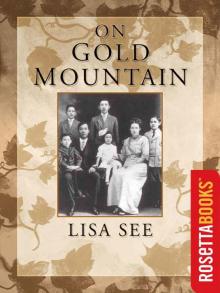 On Gold Mountain: The One-Hundred-Year Odyssey of My Chinese-American Family
On Gold Mountain: The One-Hundred-Year Odyssey of My Chinese-American Family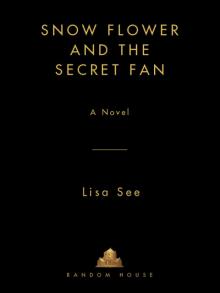 Snow Flower and the Secret Fan
Snow Flower and the Secret Fan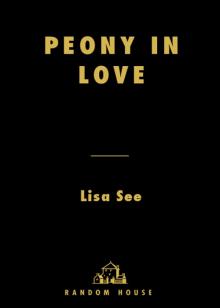 Peony in Love
Peony in Love Flower Net
Flower Net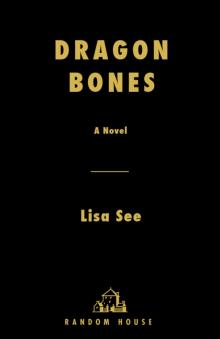 Dragon Bones
Dragon Bones Shanghai Girls
Shanghai Girls Dreams of Joy
Dreams of Joy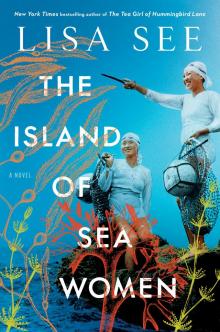 The Island of Sea Women
The Island of Sea Women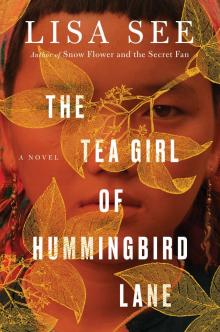 The Tea Girl of Hummingbird Lane
The Tea Girl of Hummingbird Lane China Dolls
China Dolls The Interior
The Interior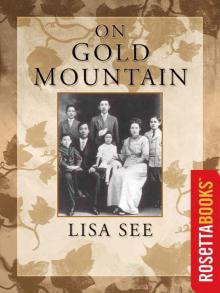 On Gold Mountain
On Gold Mountain